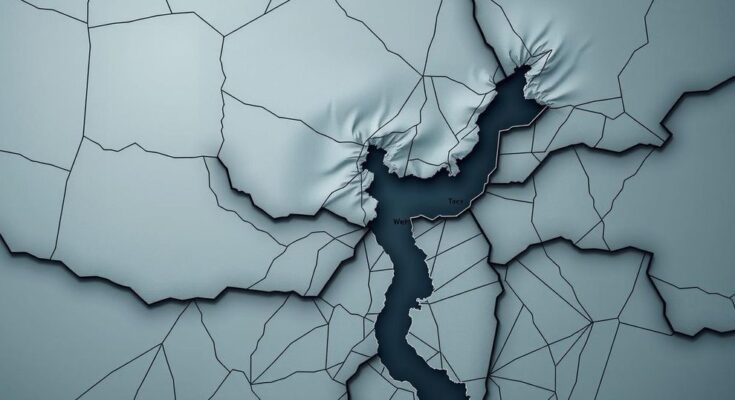M23 militia, supported by Rwanda, captures key cities in eastern DRC, aiming to reshape regional geopolitics. Humanitarian crises ensue, raising fears of broader conflict. Tensions escalate between Rwanda and Burundi, while Uganda navigates its own interests. President Tshisekedi struggles to maintain control, as international pressure is sought to stall M23’s momentum.
In late January and early February, the M23 militia captured Goma and Bukavu, significant cities in the eastern Democratic Republic of Congo (DRC). This Rwandan-backed group now commands a vast area akin to the size of Connecticut and is setting up local administrations, indicating its ambition to alter the geopolitical landscape of Africa’s Great Lakes region.
First emerging in 2012 and defeated a year later due to international pressure, M23 claims to be defending the Rwandophone population in eastern Congo, particularly the Tutsi community. However, its objectives align closely with Rwandan interests, particularly through the establishment of the political wing, Alliance du Fleuve Congo (AFC), which seeks regime change in Kinshasa.
The resurgence of M23 in November 2021 stemmed from the Congolese government’s failure to honor commitments to militia veterans and Rwanda’s concerns over its regional interests. Rwanda views the Democratic Front for the Liberation of Rwanda (FDLR) as a major security threat and is also economically motivated, as gold exported by Rwanda predominantly originates from eastern DRC.
Additionally, with neighboring Uganda and Burundi engaging in military operations against their own DRC-based insurgencies, Rwanda felt compelled to revive M23 to safeguard its interests. Reportedly, between 4,000 and 7,000 Rwandan troops were present in the DRC as of late last year, likely increasing since M23’s takeover.
The humanitarian consequences of M23’s actions are dire, resulting in the displacement of three million individuals and causing significant fatalities. Furthermore, a public health crisis looms while the risk of a broader regional conflict escalates.
In Burundi, rising tensions with Rwanda have intensified fears of war, with mutual accusations of supporting rebel groups. The border remains closed, and the UN has reported that Rwanda’s military has been targeting Burundian soldiers, forcing Burundian President Évariste Ndayishimiye to call for his citizens to prepare for conflict, labeling Rwanda an enemy.
Uganda similarly harbors economic and security interests in eastern DRC, where gold is also a vital export. Though Uganda has historically fluctuated between collaboration and competition with Rwanda in the region, reports suggest that it has provided support to M23, allowing recruitment within its territories while concurrently bolstering its military presence in the DRC.
President Felix Tshisekedi appears to be losing control over the region, with low army morale evidenced by fleeing soldiers in videos. The withdrawal of Burundian forces, a critical military ally, illustrates the collapse of his strategy. As M23 progresses southward, the focus shifts to Katanga, which is central to DRC’s mining industry, revealing internal divisions fueled by dissatisfaction towards the Kinshasa government.
The resemblance to the early phases of the Second Congolese war is disturbing, as various groups within DRC are reportedly preparing for possible violence. Current sentiments reflect fears towards those affiliated with M23, reaffirming the group’s claims of risk for Rwandaphones.
International pressure played a crucial role in the collapse of M23 in 2013. Despite President Tshisekedi’s attempts to revive this pressure on Rwanda, success has been limited. Offers for military assistance in exchange for access to DRC’s mineral wealth have met with skepticism, underscoring the fragility of the Congolese leadership.
Under the Biden administration, the U.S. denounced Rwanda’s actions, imposing sanctions on Rwandan individuals tied to the support of M23. This marked progress, yet more significant pressure will likely be required to dissolve Rwanda’s support for the militia. The timeframe for international intervention appears to be tightening as the situation becomes increasingly precarious, with M23/Rwanda expanding their control and the risk of a devastating conflict in the region mounting.
The recent actions of the M23 militia, with significant backing from Rwanda, pose a severe threat to the stability of the Great Lakes region of Africa. The humanitarian crisis is deepening as millions are displaced, and the potential for wider conflict looms. Regional dynamics involving Burundi, Uganda, and the DRC’s tenuous government have created a complex geopolitical landscape. Reviving international pressure on Rwanda remains crucial to prevent further escalation and foster stability.
Original Source: responsiblestatecraft.org




